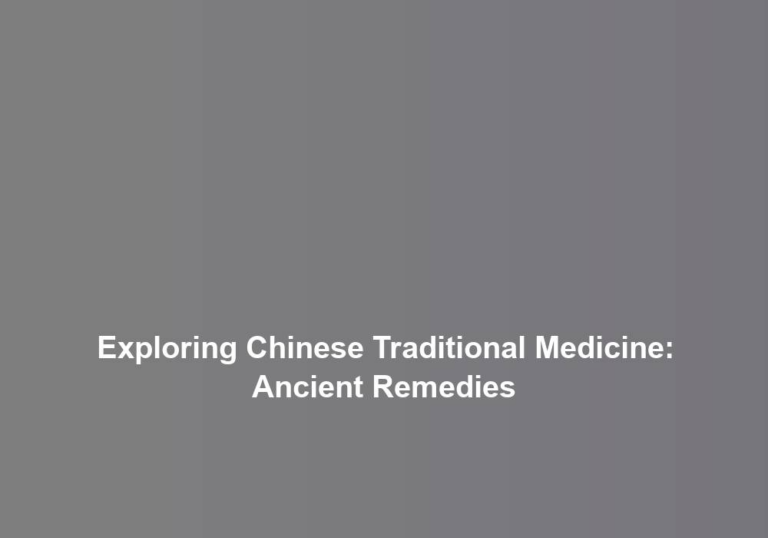Herbal Supplements Decoded: Exploring Traditional Remedies
So, youG??ve heard about the latest trend in wellness – herbal supplements. But do you really know what youG??re getting when you pop that pill or mix that powder? In a world where ancient wisdom meets modern science, the realm of herbal remedies can be a bit of a mystery. How do these traditional remedies stack up against todayG??s standards of health and wellness? And most importantly, can they truly make a difference in your well-being?
History of Herbal Remedies
Throughout human history, herbal remedies have been utilized for their medicinal properties and healing effects. Traditional practices involving the use of herbs for healing have been an integral part of cultures around the world. The cultural significance of herbal remedies is deeply rooted in ancient traditions and continues to be passed down through generations. In many societies, herbal remedies are not only seen as a form of medicine but also as a way to connect with nature and honor ancient healing practices.
As time has progressed, the uses of herbal remedies have evolved to meet the changing needs of society. While traditional practices remain important, modern applications have also emerged. Today, herbal supplements are widely used as an alternative or complementary approach to conventional medicine. The rich history and cultural significance of herbal remedies have contributed to their enduring popularity and acceptance in modern times.
Understanding the history of herbal remedies provides a sense of belonging to a broader cultural narrative. It fosters a connection to the traditions and wisdom of our ancestors, creating a sense of unity and shared experiences. The knowledge of traditional herbal practices helps individuals feel rooted in their cultural heritage, fostering a sense of community and belonging. In a world that is constantly evolving, embracing the history of herbal remedies can provide a sense of continuity and connection to the past.
Common Herbal Supplements
Common herbal supplements offer a natural and holistic approach to supporting various aspects of health and well-being. These supplements are derived from plants and have been used for centuries to promote wellness. When considering incorporating herbal supplements into your routine, itG??s important to be aware of their potential benefits and risks. Here are some common herbal supplements to consider:
-
Echinacea: Known for its immune-boosting properties, echinacea is often used to reduce the severity and duration of colds and flu. It may also aid in relieving inflammation and supporting overall immune function.
-
Ginseng: This adaptogenic herb is prized for its potential to increase energy levels, reduce stress, and enhance mental clarity. It is commonly used to combat fatigue and promote vitality.
-
Turmeric: With its active compound curcumin, turmeric is celebrated for its anti-inflammatory and antioxidant properties. It may support joint health, aid in digestion, and contribute to overall well-being.
-
Milk Thistle: Often used to promote liver health, milk thistle is believed to aid in detoxification and protect the liver from damage. It is touted for its potential to support liver function, especially in cases of toxin exposure or excessive alcohol consumption.
While these herbal supplements offer potential benefits, itG??s crucial to be mindful of potential risks and interactions, especially if you have existing health conditions or are taking medications. Consulting with a healthcare professional before integrating herbal supplements into your regimen is essential to ensure their safe and effective use.
Scientific Research on Herbal Remedies
Delve into the scientific research on herbal remedies to gain a deeper understanding of their potential health benefits and limitations. Clinical trials play a crucial role in assessing the efficacy of herbal remedies. These trials are designed to evaluate the safety and effectiveness of herbal medicines, providing valuable insights into their potential uses in modern healthcare integration.
| Clinical Trials | Efficacy of Herbal Remedies |
|---|---|
| Controlled studies | Determine the effectiveness of herbal remedies |
| Placebo comparisons | Assess the impact of herbal treatments compared to placebos |
| Long-term monitoring | Evaluate the safety and potential side effects of herbal medicines |
| Meta-analyses | Combine data from multiple studies to draw comprehensive conclusions |
Through controlled studies, researchers can determine the effectiveness of herbal remedies in addressing specific health concerns. Placebo comparisons help in assessing the actual impact of herbal treatments by comparing them with inert substances. Long-term monitoring of patients consuming herbal medicines allows for the evaluation of safety and the identification of potential side effects. Lastly, meta-analyses enable researchers to combine data from multiple clinical trials, providing a more comprehensive understanding of the overall efficacy of herbal remedies.
Safety and Regulation of Herbal Supplements
Assessing the safety and regulation of herbal supplements is crucial in understanding their potential health benefits and limitations, particularly as they become integrated into modern healthcare. When it comes to the safety and regulation of herbal supplements, itG??s important to consider the following:
-
Regulatory Standards: Herbal supplements are not as strictly regulated as pharmaceutical drugs. In many countries, they are considered dietary supplements, which means they are not subject to the same rigorous testing and approval process as prescription medications. However, various regulatory standards and guidelines are in place to ensure the safety and quality of these products.
-
Potential Side Effects: While herbal supplements are generally considered natural, they can still have potential side effects. ItG??s important to recognize that just because a product is labeled as G??naturalG?? does not automatically mean it is safe for everyone. Some herbal supplements may interact with medications or have adverse effects on certain individuals.
-
Quality Control: The quality of herbal supplements can vary widely. Without strict regulatory oversight, there is a risk of inconsistency in the manufacturing and labeling of these products. This makes it crucial to look for reputable brands and manufacturers that adhere to quality control standards.
-
Consultation with Healthcare Providers: Before incorporating herbal supplements into your healthcare routine, itG??s essential to consult with a healthcare provider, particularly if you have underlying health conditions or are taking medications. Healthcare professionals can provide personalized guidance on the safety and appropriateness of herbal supplements for your individual needs.
Integrating Herbal Remedies Into Your Health Routine
Integrating herbal remedies into your health routine can offer a natural and holistic approach to supporting your well-being. In modern medicine, herbal remedies are increasingly being recognized for their potential health benefits. Many traditional herbal supplements have been used for centuries to address various health concerns and are now being studied for their potential therapeutic properties. Incorporating herbal remedies into your routine can complement your overall health and wellness efforts.
One of the significant benefits of herbal supplements is their potential to support various aspects of health. For example, some herbs are known for their immune-boosting properties, while others may aid in promoting relaxation and reducing stress. Additionally, certain herbal remedies have been studied for their potential to support digestive health and overall vitality. By integrating these supplements into your routine, you may experience a more balanced approach to maintaining your well-being.
Furthermore, herbal supplements can offer a natural alternative to conventional medications for certain health conditions. While itG??s essential to consult with a healthcare professional before making any changes to your health regimen, integrating herbal remedies can be a valuable addition to your overall wellness plan. As you explore the integration of herbal remedies into your health routine, consider seeking guidance from qualified practitioners who can provide personalized recommendations based on your individual needs and health goals.
Conclusion
Now that youG??ve explored the history, common supplements, scientific research, and safety of herbal remedies, itG??s time to integrate them into your health routine. While some may question the effectiveness of herbal remedies, scientific research continues to uncover their benefits. Whether itG??s improving digestion with ginger or reducing anxiety with chamomile, these traditional remedies have stood the test of time. Give them a try and see the results for yourself.







